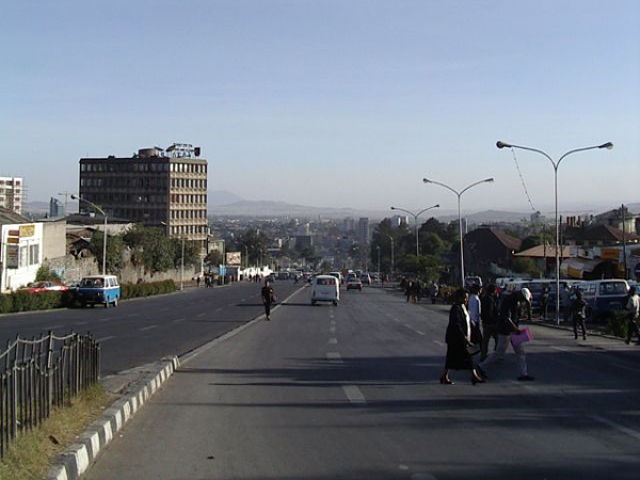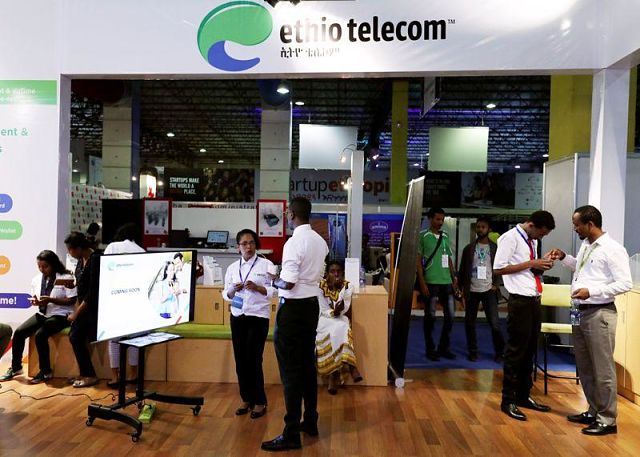 The country manager elaborated further on the World Bank’s pledge to invest $200 million into the market via the new Digital Ethiopia Foundations project, saying the strategy was aimed at creating “the legal and regulatory building blocks for the digital ecosystem, in areas like e-commerce and Digital ID.” (DT)
The country manager elaborated further on the World Bank’s pledge to invest $200 million into the market via the new Digital Ethiopia Foundations project, saying the strategy was aimed at creating “the legal and regulatory building blocks for the digital ecosystem, in areas like e-commerce and Digital ID.” (DT)
Developing Telecoms
The World Bank has confirmed plans to invest $200 million into Ethiopia’s digital economy as the country liberalises its telecoms market, but has cautioned that policies aimed at encouraging new entrants to lease infrastructure from Ethio Telecom could prove counterproductive.
Ousmane Dione, World Bank country director for Eritrea, Ethiopia, South Sudan and Sudan, warned that deployments could stall if new operators were pushed to lease infrastructure from Ethio Telecom rather than independent tower firms, arguing that it would be best if market entrants were able to “make rational decisions whether to build their own infrastructure.”
“To benefit fully from competition does not mean offering preferential treatment to Ethio Telecom but rather creating a level playing field on which it can compete fairly with its new rivals,” argued Dione. He noted that rural areas could be particularly badly affected.
Ethio Telecom has long held a monopoly in the market, with the bidding process for two new universal licences currently underway as Ethiopia moves towards opening up its telecoms sector. Operator groups including Etisalat, MTN, Orange, STC and a consortium headed by Vodafone are competing for the licences.
However, Dione noted that regulations governing the construction of private infrastructure and restricting foreign ownership of finance providers would be damaging both to new entrants seeking to set up financial offerings as well as Ethio Telecom.
“Ultimately, policies that seek to protect Ethio Telecom’s infrastructure by allowing it to charge high prices for interconnection will end up harming the company,” added Dione.
The country manager elaborated further on the World Bank’s pledge to invest $200 million into the market via the new Digital Ethiopia Foundations project, saying the strategy was aimed at creating “the legal and regulatory building blocks for the digital ecosystem, in areas like e-commerce and Digital ID.”
—
Related:
UPDATE: Ethiopia Extends Deadline for New Telecom License Bids by a Month

Ethiopia’s telecoms industry is considered the big prize in a push to liberalize the economy because of the huge size of the market, which serves more than 100 million people. (Photo: Ethio Telecom)
Reuters
Updated: February 2nd, 2021
Ethiopia has extended the deadline for telecom firms to bid for new operating licenses by a month to April 5, the sector regulator said on Monday, citing requests from interested companies.
The Horn of Africa nation’s telecoms industry is considered the big prize in a push to liberalize the economy because of the huge size of the market, which serves more than 100 million people.
Prime Minister Abiy Ahmed is pressing ahead with the auction of the new licenses and the sale of a 45% stake in state monopoly Ethio Telecoms, in spite of a military conflict in the northern Tigray region.
Firms will be required to submit their technical and financial bids by April 5, compared with a previous deadline of March 5, the Ethiopian Communications Authority said in a statement.
Winners will be given full operating licenses, but they will not be allowed to offer mobile phone-based financial services, government officials said last year.
They will also be required to set up their own network infrastructure, such as cellphone towers, they said.
Kenya’s top operator Safaricom, which has expressed an interest in a consortium with Vodafone and Vodacom, estimated in 2019 it would have to pay about $1 billion for a new license.
Other firms that have expressed an interest include South Africa’s MTN, Etisalat from the United Arab Emirates and France’s Orange SA.
—
Related:
Ethiopia Telecom Reports 12% Rise in H1 Revenue

The government said last year it will retain a 55% stake in Ethio Telecom, with 40% going to international companies and the remainder to local investors. (Reuters photo)
Reuters
Updated: January 22nd, 2021
State-run Ethio Telecom, expected to be partly sold off as Ethiopia liberalises its economy, reported a 12% rise in first-half revenue to end-December to 25.6 billion birr ($650 million), it said on Thursday.
The government said last year it will retain a 55% stake in Ethio Telecom, with 40% going to international companies and the remainder to local investors.
Ethio Telecom said mobile voice services contributed 49% of the revenue and data services some 26%.
The company plans to launch mobile money services soon, it said, but did not give a timeframe.
In June, the telecoms regulator said it had received 12 bids for two telecom licences the government plans to award to multinational companies.
The regulator has not given a deadline for when it will award the licences.
Ethiopia’s telecoms industry is considered the big prize in a push to liberalise the economy as a protected market which serves more than 110 million people.
($1 = 39.3650 birr)
—
Join the conversation on Twitter and Facebook.

























